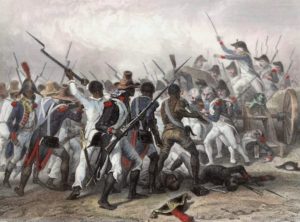
Battle of Vertières in 1803. Image courtesy of Wikipedia.
There is a seamless historical continuity between the Great Liberator Simon Bolivar’s arrival in Haiti on this date 200 years ago and the United Nation’s acknowledgment last month that its peacekeeping forces were deeply involved in a cholera outbreak that left as many as 10,000 Haitians dead.
The narrative that binds the two events together is, on its most molecular level, one of Haiti’s betrayal, both by the international community at large, and by its Latin American neighbors, in a string of broken promises that dates back 200 years to Bolivar’s arrival in Haiti.
When Bolivar arrived, as the Haitian writer Dady Chery has written, Bolivar was desperate for help to fight the Spanish, and had no other real options than the tiny, Caribbean nation that had pulled off what is—to this day—the only successful slave revolt in the Western Hemisphere. The only other Republic in the Americas at the time was the U.S., where slavery was in full flower.
With his attempts to emancipate the northern regions of South America throttled by Spain’s superior military, Bolivar had been refused help by the British in Jamaica. He turned to Haiti to seek an audience with President Alexandre Petion, who agreed to see him the following day.
The two men met, on January 1, 1816, and Petion interrogated the younger man, a former slave owner and notorious philanderer: “How can you found a republic where slavery exists?”
A pact was struck. Chery wrote that in exchange for Bolivar’s promise to free all slaves from liberated territories, Petion agreed to provide Bolivar and his 250 men with a small fleet, money, food, a printing press for propaganda, and weapons for 6,000 men, including 4,000 muskets and 15,000 pounds of gunpowder.
Read more here.

